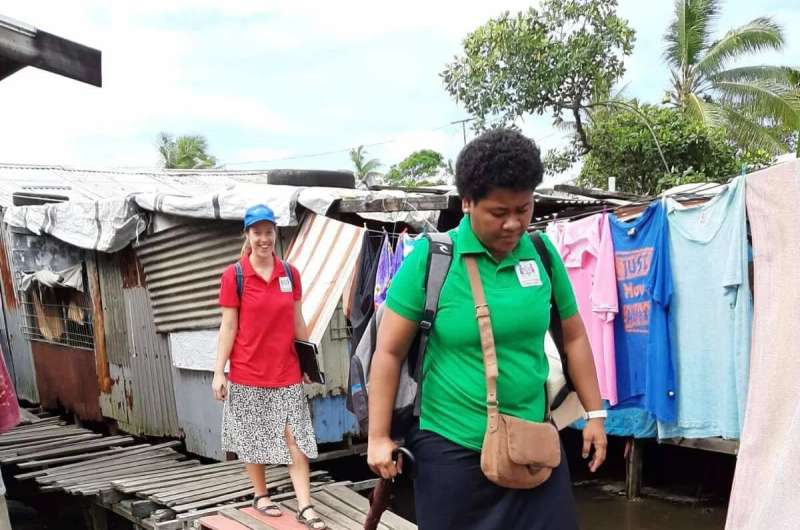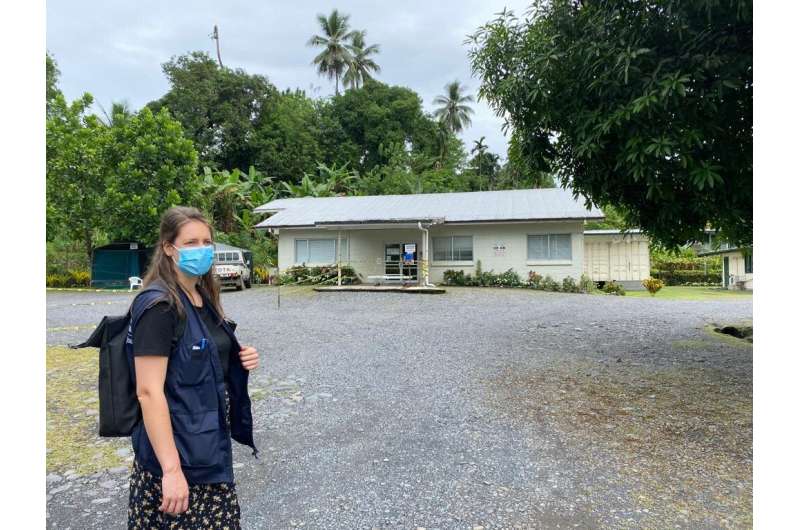Why Papua New Guinea vaccine coverage matters for Australians

While Australia is among the world's highest vaccinated countries, a number of Pacific nations are struggling to vaccinate even one-quarter of their population. It's an issue that has profound implications not only for the local populations, but for Australians and, indeed, the entire globe, according to Dr. Stefanie Vaccher, epidemiologist and senior research fellow at Burnet Institute.
Geographic borders don't provide protection against virus mutations that occur largely within unvaccinated populations where the virus spreads unchecked, Dr. Vaccher points out. And despite hopeful hypotheses to the contrary, Dr. Vaccher makes it clear the next variant could well be more potent than the delta and omicron variants, which both wreaked havoc across Australia. That's why Dr. Vaccher, currently based in Papua New Guinea with Burnet, is adamant that at a global level, "the virus isn't over for anyone, until it's over for everyone."
Australia can play a major role according to Dr. Vaccher, but it's not as simple as supplying large quantities of vaccines and considering it "job done." The low vaccination rates in PNG for example aren't due to lack of supply, she explains. There's adequate supply at national level, with much of it going unused and in some cases in danger of expiring.
"There's plenty of vaccines available, but uptake is the major issue due to vaccine hesitancy and low demand," Dr. Vaccher said.
It's a complex issue that intersects with local culture, geography, religion and politics, according to Dr. Vaccher. "Addressing misinformation and wrongly held beliefs is a real key," she said. She points to language barrier issues, and the extensive resources required to translate education and information materials relating to COVID-19 into Tok Pisin, PNG's official language—let alone the 700 to 800 languages that are spoken throughout the country.
"On top of that, literacy rates aren't extremely high in PNG, so other options such as radio broadcasts and sending out small outreach teams are vital," Dr. Vaccher said. "However, due to vaccine skepticism in some areas, there have been issues with people swearing, throwing things and physically assaulting outreach teams. Regional surveys show that people in PNG have low trust in government and what they read online from the media. However, they do tend to trust community leaders like pastors, or other religious figures, but often these people are vaccine hesitant, or sometimes outrightly against them. This also includes a considerable proportion of healthcare workers, unfortunately. The point is, just saying, 'oh, we've shipped a million vaccines over' isn't helpful."
Instead, Dr. Vaccher believes greater efforts need to be made to bring local communities on board. "It's about supporting local leadership to effect meaningful engagement and impact; to help have discussions at a local level—to say, 'I've been vaccinated, I didn't have any bad side effects, I feel protected, I haven't had COVID, or, I had COVID, but it was very mild, and I know other people have gotten very sick, as they were not vaccinated.'"
"It's these types of conversations where change occurs, but that's a lot of discussions that need to be had across a region that is diverse culturally, linguistically and geographically. That takes time and resources, and you have to build a level of trust."
Dr. Vaccher said efforts are also impacted by practical and logistical challenges. "Transport has always been an issue—getting health care workers out to some of the more remote communities can be difficult if they don't have fuel or the car is being used by another team," she said. "Healthcare workers are often overstretched already, so staffing is another common problem. It's important to be able to work with the provincial health authorities and local governments to go through fundamental planning steps to identify who needs to be vaccinated, how that process is going to happen, and then make sure there's the resources available to enact it."

Dr. Vaccher believes the scientific community at a global level has a considerable role to play in ensuring research applies not only to wealthier, well resourced nations—but also to low- and middle-income countries. "For example, in PNG there isn't an adequate cold chain, so there isn't really the possibility to have the mRNA vaccines that you see a lot more positive media coverage of in Australia. The majority of published studies examine the efficacy of Pfizer boosters or Moderna boosters, but those vaccines are not feasible to implement in a lot of countries globally. So how about we provide robust evidence that shows an AstraZeneca booster or JJ (Johnson & Johnson) booster is still effective, because, people aren't going to want to get the vaccine that they're told isn't going to be safe and effective."
Dr. Vaccher believes that throughout COVID-19 pandemic the majority of countries have been inwardly focused, but that must change in order to help prevent dangerous new variants developing in unvaccinated populations. "Now more than ever is an opportunity to think bigger and think globally," she said.
"There's more boosters being given out every day around the world than there are vaccine doses in low- and middle-income countries. It's not about researchers just collecting data—it's about working with people on the ground, working with communities, local governments and health authorities to understand the situation and find out what the needs are and how they can use their resources to best assist.
"Generating a better understanding of the efficacy of different vaccine combinations in use in places like PNG is the first step. For instance, a three-dose combination of AstraZeneca/AstraZeneca/Johnson & Johnson won't have been used in Australia, but is common in PNG. The next step is outreach, supporting local leaders to ensure that those results are being translated, understood and the messages are reaching their communities to generate demand for vaccination.
"That's where our strength at Burnet lies, in that we are in a position to support this breadth of activities. We have the life sciences researchers, the epidemiologists, the social scientists that can translate and implement findings, and most importantly, we have teams on the ground and partnerships across PNG with long-term relationships with the community."
Burnet has a range of projects underway to address vaccine hesitancy and create demand; working closely with local organizations including PNG's National Department Of Health, provincial health authorities, and Catholic Church Health Services to develop local information, education and communication materials. The initiatives coincide with work focusing on health system strengthening to improve access and service delivery.
"Burnet is in a really good position to be able to provide further support in this area. But there's also plenty of other organizations that have resources that can be drawn upon to work together to make that more impactful, faster and relevant," Dr. Vaccher said.
While vaccine coverage is a major concern, Dr. Vaccher believes economic, infrastructure and political issues across many Pacific Island nations make other control measures such as self isolation, testing, the use of masks, and crowd density limits difficult to apply.
Working from home is not a feasible reality for the vast majority of the population, for example, or stocking up at the shops if you need to self isolate. That implies you have money to be able to buy several weeks' of groceries at time, and have electricity to be able to keep things fresh in a fridge or a freezer.
"The nature of life in a lot of these countries is very community focused. There tends to be multiple generations of family or extended family living together or moving between houses. That makes it very difficult to prevent the virus from spreading.
"Masks are often not used. A lot of the cloth masks that are used aren't washed often, so there is limited effectiveness in that. Often stricter health measures, such as bans on large gatherings are not popular with people, so there can be a reluctance from politicians to push for them and implement them.
"There's countries across the Pacific that are recently having outbreaks for the very first time such as Kiribati, Solomon Islands, and Palau. It's now March 2020 for them. It's easier in a place like Australia, where you can isolate, where testing—for all its issues—is accessible, and where the government has social support strategies. However, that's not the reality for a lot of people across the Pacific, and across the world.
"PNG has already experienced devastating outbreaks, and I think the risk across the Pacific more broadly is that the region will now really kick off in terms of cases, and there isn't the health infrastructure to cope. I think Australians naturally want to return to their normal lives, but that's not feasible for a lot of people. As such, the risk for virus mutations and more severe variants remain a concerning issue globally.
"I think the main message for Australians is that COVID-19 isn't over—it's a very long way from being over."





















